NURSING RESEARCH: Qualitative Critique of CPAP and OSA Impact
VerifiedAdded on 2023/01/05
|7
|1393
|22
Essay
AI Summary
This essay presents a critical appraisal of two qualitative research studies focusing on the use of Continuous Positive Airway Pressure (CPAP) in bariatric patients with Obstructive Sleep Apnea (OSA) and its impact on postoperative outcomes. The critique examines two articles, one a systematic review and meta-analysis and the other a prospective study, both investigating the effectiveness of CPAP in reducing postoperative adverse events. The analysis covers the methodologies employed, including literature reviews and patient data analysis, and compares the results obtained by each study. Ethical considerations, such as patient privacy, data confidentiality, and autonomy, are also discussed in the context of conducting such research. Ultimately, the essay aims to synthesize the findings of these studies to determine the potential benefits and limitations of CPAP in managing OSA-related risks in bariatric surgical patients and how these findings can be applied in nursing practice. Desklib is a platform where you can find similar solved assignments and past papers for students.
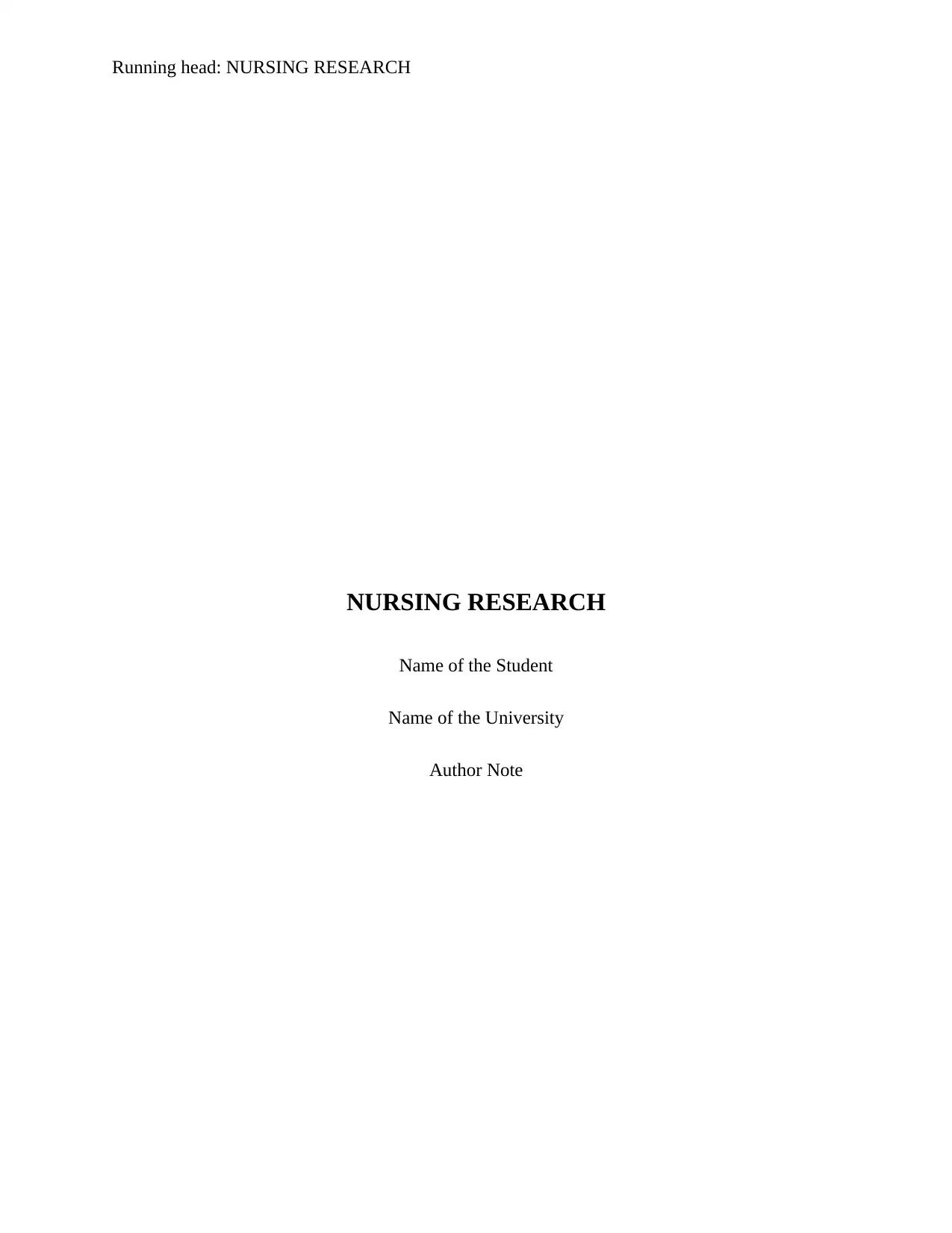
Running head: NURSING RESEARCH
NURSING RESEARCH
Name of the Student
Name of the University
Author Note
NURSING RESEARCH
Name of the Student
Name of the University
Author Note
Paraphrase This Document
Need a fresh take? Get an instant paraphrase of this document with our AI Paraphraser
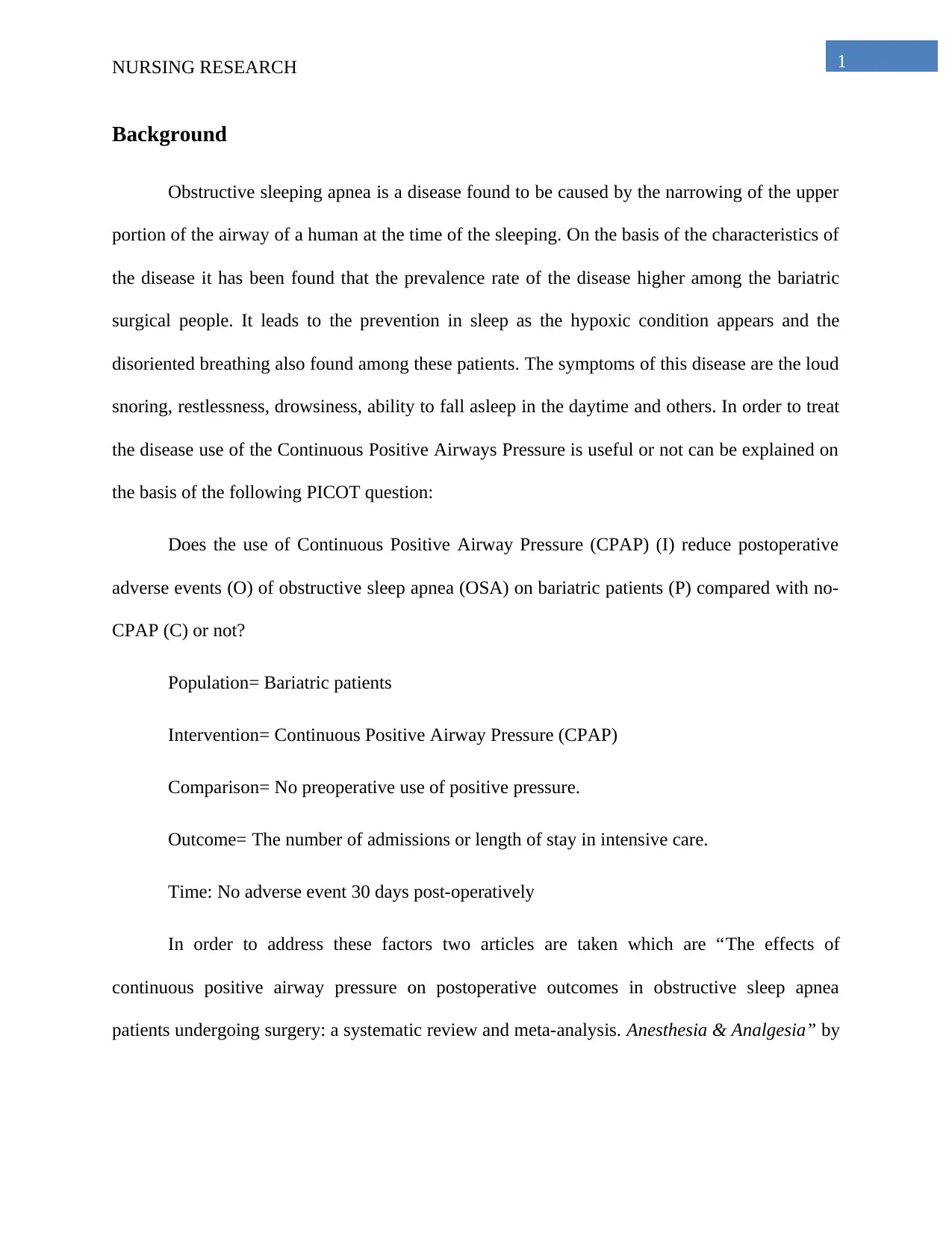
1NURSING RESEARCH
Background
Obstructive sleeping apnea is a disease found to be caused by the narrowing of the upper
portion of the airway of a human at the time of the sleeping. On the basis of the characteristics of
the disease it has been found that the prevalence rate of the disease higher among the bariatric
surgical people. It leads to the prevention in sleep as the hypoxic condition appears and the
disoriented breathing also found among these patients. The symptoms of this disease are the loud
snoring, restlessness, drowsiness, ability to fall asleep in the daytime and others. In order to treat
the disease use of the Continuous Positive Airways Pressure is useful or not can be explained on
the basis of the following PICOT question:
Does the use of Continuous Positive Airway Pressure (CPAP) (I) reduce postoperative
adverse events (O) of obstructive sleep apnea (OSA) on bariatric patients (P) compared with no-
CPAP (C) or not?
Population= Bariatric patients
Intervention= Continuous Positive Airway Pressure (CPAP)
Comparison= No preoperative use of positive pressure.
Outcome= The number of admissions or length of stay in intensive care.
Time: No adverse event 30 days post-operatively
In order to address these factors two articles are taken which are “The effects of
continuous positive airway pressure on postoperative outcomes in obstructive sleep apnea
patients undergoing surgery: a systematic review and meta-analysis. Anesthesia & Analgesia” by
Background
Obstructive sleeping apnea is a disease found to be caused by the narrowing of the upper
portion of the airway of a human at the time of the sleeping. On the basis of the characteristics of
the disease it has been found that the prevalence rate of the disease higher among the bariatric
surgical people. It leads to the prevention in sleep as the hypoxic condition appears and the
disoriented breathing also found among these patients. The symptoms of this disease are the loud
snoring, restlessness, drowsiness, ability to fall asleep in the daytime and others. In order to treat
the disease use of the Continuous Positive Airways Pressure is useful or not can be explained on
the basis of the following PICOT question:
Does the use of Continuous Positive Airway Pressure (CPAP) (I) reduce postoperative
adverse events (O) of obstructive sleep apnea (OSA) on bariatric patients (P) compared with no-
CPAP (C) or not?
Population= Bariatric patients
Intervention= Continuous Positive Airway Pressure (CPAP)
Comparison= No preoperative use of positive pressure.
Outcome= The number of admissions or length of stay in intensive care.
Time: No adverse event 30 days post-operatively
In order to address these factors two articles are taken which are “The effects of
continuous positive airway pressure on postoperative outcomes in obstructive sleep apnea
patients undergoing surgery: a systematic review and meta-analysis. Anesthesia & Analgesia” by
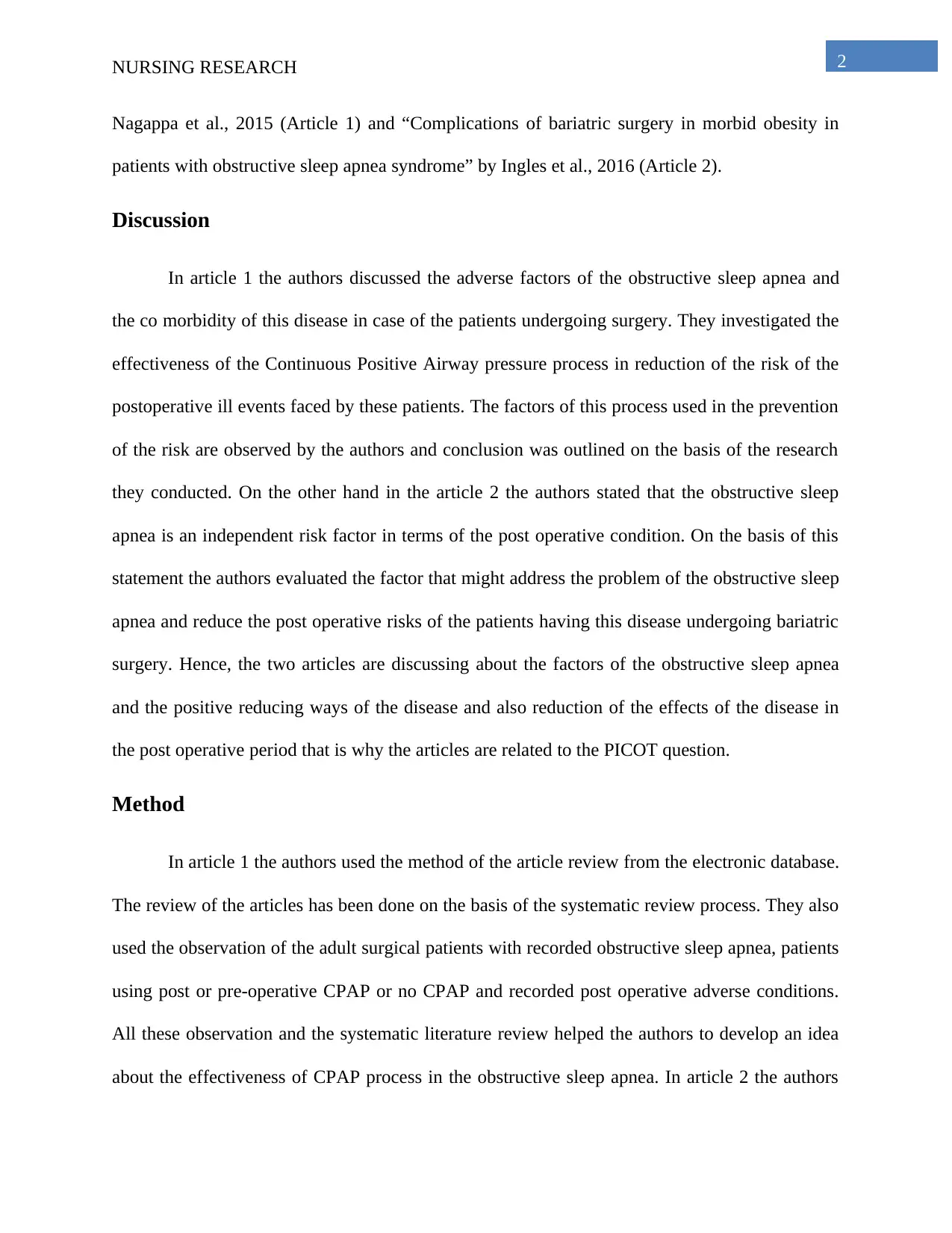
2NURSING RESEARCH
Nagappa et al., 2015 (Article 1) and “Complications of bariatric surgery in morbid obesity in
patients with obstructive sleep apnea syndrome” by Ingles et al., 2016 (Article 2).
Discussion
In article 1 the authors discussed the adverse factors of the obstructive sleep apnea and
the co morbidity of this disease in case of the patients undergoing surgery. They investigated the
effectiveness of the Continuous Positive Airway pressure process in reduction of the risk of the
postoperative ill events faced by these patients. The factors of this process used in the prevention
of the risk are observed by the authors and conclusion was outlined on the basis of the research
they conducted. On the other hand in the article 2 the authors stated that the obstructive sleep
apnea is an independent risk factor in terms of the post operative condition. On the basis of this
statement the authors evaluated the factor that might address the problem of the obstructive sleep
apnea and reduce the post operative risks of the patients having this disease undergoing bariatric
surgery. Hence, the two articles are discussing about the factors of the obstructive sleep apnea
and the positive reducing ways of the disease and also reduction of the effects of the disease in
the post operative period that is why the articles are related to the PICOT question.
Method
In article 1 the authors used the method of the article review from the electronic database.
The review of the articles has been done on the basis of the systematic review process. They also
used the observation of the adult surgical patients with recorded obstructive sleep apnea, patients
using post or pre-operative CPAP or no CPAP and recorded post operative adverse conditions.
All these observation and the systematic literature review helped the authors to develop an idea
about the effectiveness of CPAP process in the obstructive sleep apnea. In article 2 the authors
Nagappa et al., 2015 (Article 1) and “Complications of bariatric surgery in morbid obesity in
patients with obstructive sleep apnea syndrome” by Ingles et al., 2016 (Article 2).
Discussion
In article 1 the authors discussed the adverse factors of the obstructive sleep apnea and
the co morbidity of this disease in case of the patients undergoing surgery. They investigated the
effectiveness of the Continuous Positive Airway pressure process in reduction of the risk of the
postoperative ill events faced by these patients. The factors of this process used in the prevention
of the risk are observed by the authors and conclusion was outlined on the basis of the research
they conducted. On the other hand in the article 2 the authors stated that the obstructive sleep
apnea is an independent risk factor in terms of the post operative condition. On the basis of this
statement the authors evaluated the factor that might address the problem of the obstructive sleep
apnea and reduce the post operative risks of the patients having this disease undergoing bariatric
surgery. Hence, the two articles are discussing about the factors of the obstructive sleep apnea
and the positive reducing ways of the disease and also reduction of the effects of the disease in
the post operative period that is why the articles are related to the PICOT question.
Method
In article 1 the authors used the method of the article review from the electronic database.
The review of the articles has been done on the basis of the systematic review process. They also
used the observation of the adult surgical patients with recorded obstructive sleep apnea, patients
using post or pre-operative CPAP or no CPAP and recorded post operative adverse conditions.
All these observation and the systematic literature review helped the authors to develop an idea
about the effectiveness of CPAP process in the obstructive sleep apnea. In article 2 the authors
⊘ This is a preview!⊘
Do you want full access?
Subscribe today to unlock all pages.

Trusted by 1+ million students worldwide
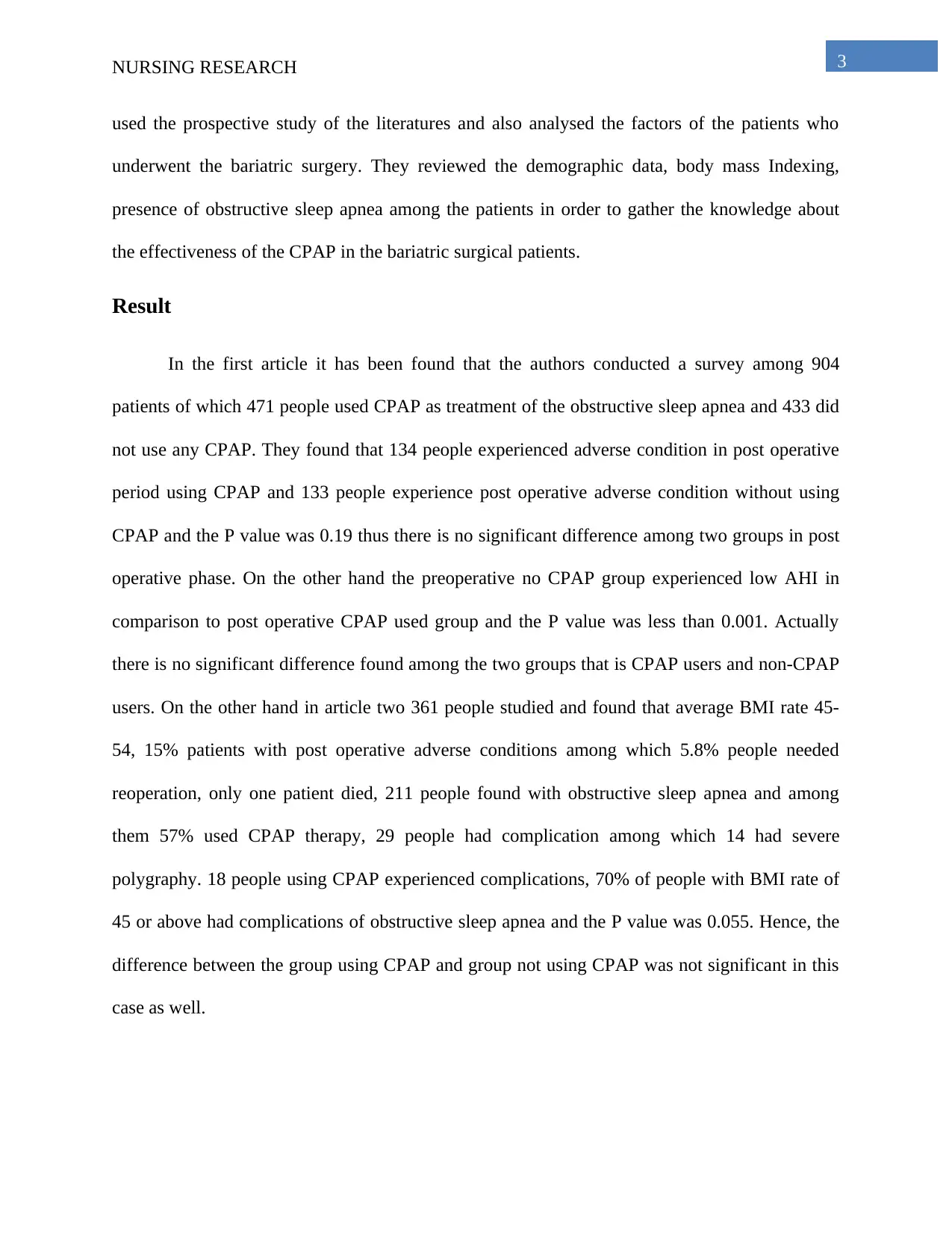
3NURSING RESEARCH
used the prospective study of the literatures and also analysed the factors of the patients who
underwent the bariatric surgery. They reviewed the demographic data, body mass Indexing,
presence of obstructive sleep apnea among the patients in order to gather the knowledge about
the effectiveness of the CPAP in the bariatric surgical patients.
Result
In the first article it has been found that the authors conducted a survey among 904
patients of which 471 people used CPAP as treatment of the obstructive sleep apnea and 433 did
not use any CPAP. They found that 134 people experienced adverse condition in post operative
period using CPAP and 133 people experience post operative adverse condition without using
CPAP and the P value was 0.19 thus there is no significant difference among two groups in post
operative phase. On the other hand the preoperative no CPAP group experienced low AHI in
comparison to post operative CPAP used group and the P value was less than 0.001. Actually
there is no significant difference found among the two groups that is CPAP users and non-CPAP
users. On the other hand in article two 361 people studied and found that average BMI rate 45-
54, 15% patients with post operative adverse conditions among which 5.8% people needed
reoperation, only one patient died, 211 people found with obstructive sleep apnea and among
them 57% used CPAP therapy, 29 people had complication among which 14 had severe
polygraphy. 18 people using CPAP experienced complications, 70% of people with BMI rate of
45 or above had complications of obstructive sleep apnea and the P value was 0.055. Hence, the
difference between the group using CPAP and group not using CPAP was not significant in this
case as well.
used the prospective study of the literatures and also analysed the factors of the patients who
underwent the bariatric surgery. They reviewed the demographic data, body mass Indexing,
presence of obstructive sleep apnea among the patients in order to gather the knowledge about
the effectiveness of the CPAP in the bariatric surgical patients.
Result
In the first article it has been found that the authors conducted a survey among 904
patients of which 471 people used CPAP as treatment of the obstructive sleep apnea and 433 did
not use any CPAP. They found that 134 people experienced adverse condition in post operative
period using CPAP and 133 people experience post operative adverse condition without using
CPAP and the P value was 0.19 thus there is no significant difference among two groups in post
operative phase. On the other hand the preoperative no CPAP group experienced low AHI in
comparison to post operative CPAP used group and the P value was less than 0.001. Actually
there is no significant difference found among the two groups that is CPAP users and non-CPAP
users. On the other hand in article two 361 people studied and found that average BMI rate 45-
54, 15% patients with post operative adverse conditions among which 5.8% people needed
reoperation, only one patient died, 211 people found with obstructive sleep apnea and among
them 57% used CPAP therapy, 29 people had complication among which 14 had severe
polygraphy. 18 people using CPAP experienced complications, 70% of people with BMI rate of
45 or above had complications of obstructive sleep apnea and the P value was 0.055. Hence, the
difference between the group using CPAP and group not using CPAP was not significant in this
case as well.
Paraphrase This Document
Need a fresh take? Get an instant paraphrase of this document with our AI Paraphraser
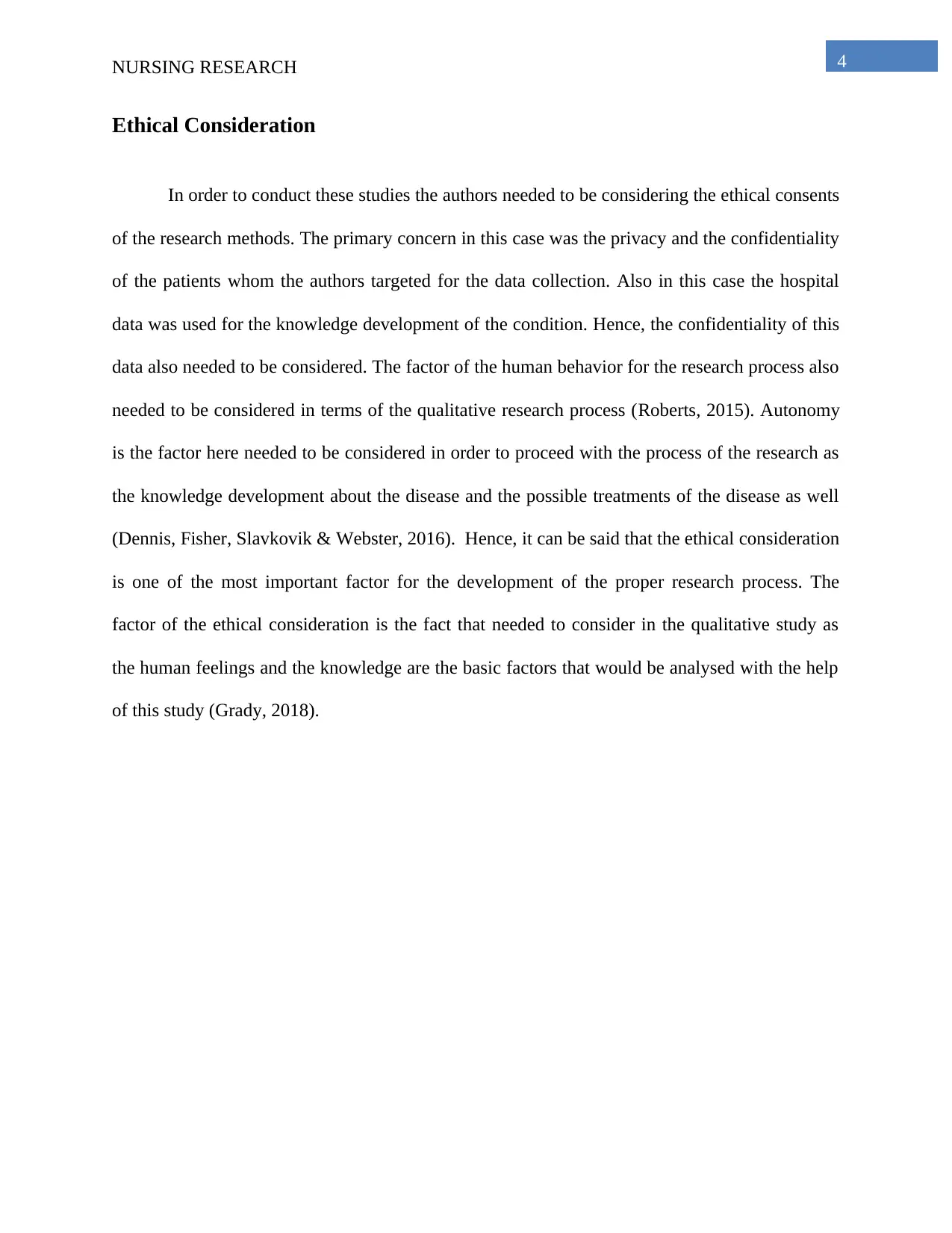
4NURSING RESEARCH
Ethical Consideration
In order to conduct these studies the authors needed to be considering the ethical consents
of the research methods. The primary concern in this case was the privacy and the confidentiality
of the patients whom the authors targeted for the data collection. Also in this case the hospital
data was used for the knowledge development of the condition. Hence, the confidentiality of this
data also needed to be considered. The factor of the human behavior for the research process also
needed to be considered in terms of the qualitative research process (Roberts, 2015). Autonomy
is the factor here needed to be considered in order to proceed with the process of the research as
the knowledge development about the disease and the possible treatments of the disease as well
(Dennis, Fisher, Slavkovik & Webster, 2016). Hence, it can be said that the ethical consideration
is one of the most important factor for the development of the proper research process. The
factor of the ethical consideration is the fact that needed to consider in the qualitative study as
the human feelings and the knowledge are the basic factors that would be analysed with the help
of this study (Grady, 2018).
Ethical Consideration
In order to conduct these studies the authors needed to be considering the ethical consents
of the research methods. The primary concern in this case was the privacy and the confidentiality
of the patients whom the authors targeted for the data collection. Also in this case the hospital
data was used for the knowledge development of the condition. Hence, the confidentiality of this
data also needed to be considered. The factor of the human behavior for the research process also
needed to be considered in terms of the qualitative research process (Roberts, 2015). Autonomy
is the factor here needed to be considered in order to proceed with the process of the research as
the knowledge development about the disease and the possible treatments of the disease as well
(Dennis, Fisher, Slavkovik & Webster, 2016). Hence, it can be said that the ethical consideration
is one of the most important factor for the development of the proper research process. The
factor of the ethical consideration is the fact that needed to consider in the qualitative study as
the human feelings and the knowledge are the basic factors that would be analysed with the help
of this study (Grady, 2018).
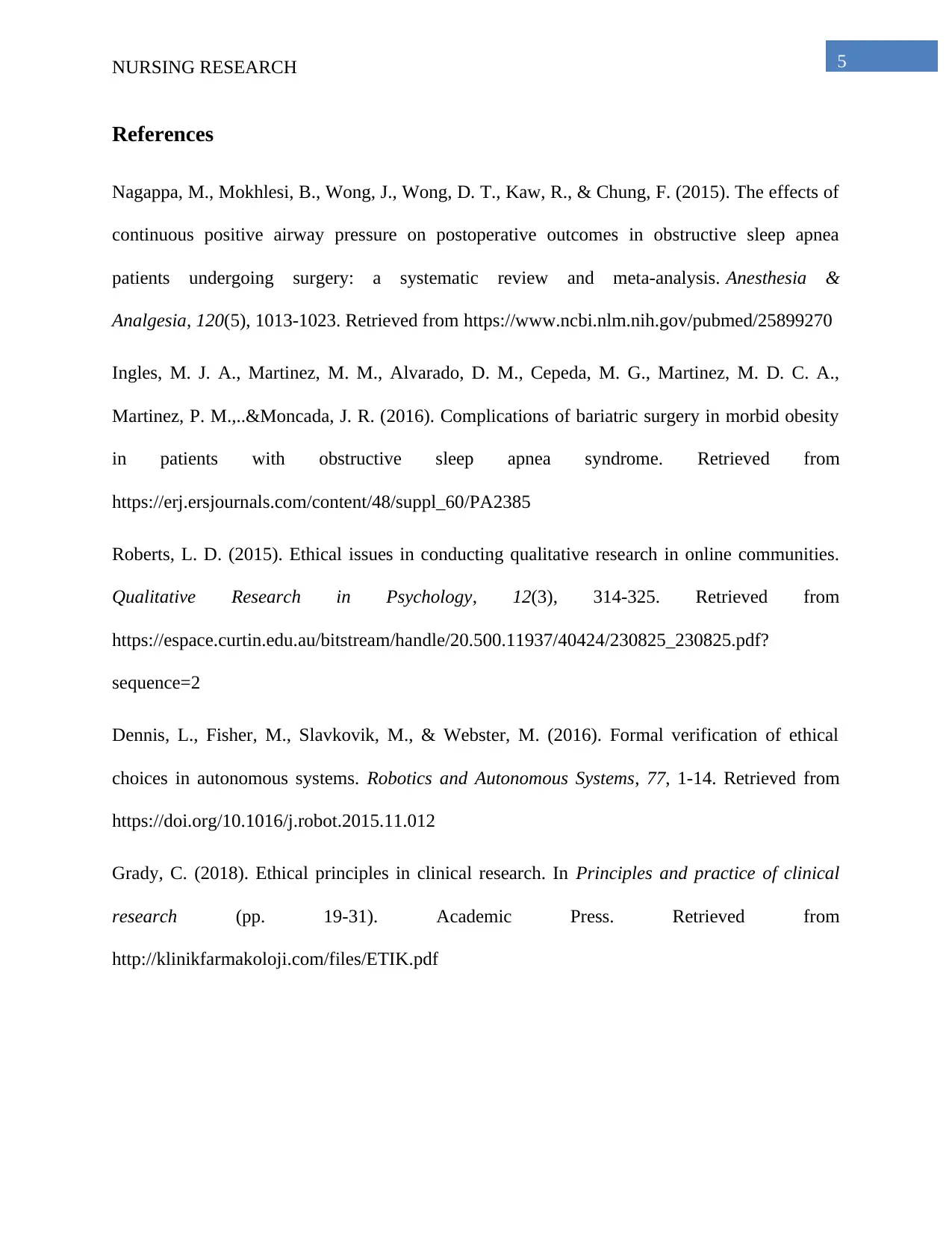
5NURSING RESEARCH
References
Nagappa, M., Mokhlesi, B., Wong, J., Wong, D. T., Kaw, R., & Chung, F. (2015). The effects of
continuous positive airway pressure on postoperative outcomes in obstructive sleep apnea
patients undergoing surgery: a systematic review and meta-analysis. Anesthesia &
Analgesia, 120(5), 1013-1023. Retrieved from https://www.ncbi.nlm.nih.gov/pubmed/25899270
Ingles, M. J. A., Martinez, M. M., Alvarado, D. M., Cepeda, M. G., Martinez, M. D. C. A.,
Martinez, P. M.,..&Moncada, J. R. (2016). Complications of bariatric surgery in morbid obesity
in patients with obstructive sleep apnea syndrome. Retrieved from
https://erj.ersjournals.com/content/48/suppl_60/PA2385
Roberts, L. D. (2015). Ethical issues in conducting qualitative research in online communities.
Qualitative Research in Psychology, 12(3), 314-325. Retrieved from
https://espace.curtin.edu.au/bitstream/handle/20.500.11937/40424/230825_230825.pdf?
sequence=2
Dennis, L., Fisher, M., Slavkovik, M., & Webster, M. (2016). Formal verification of ethical
choices in autonomous systems. Robotics and Autonomous Systems, 77, 1-14. Retrieved from
https://doi.org/10.1016/j.robot.2015.11.012
Grady, C. (2018). Ethical principles in clinical research. In Principles and practice of clinical
research (pp. 19-31). Academic Press. Retrieved from
http://klinikfarmakoloji.com/files/ETIK.pdf
References
Nagappa, M., Mokhlesi, B., Wong, J., Wong, D. T., Kaw, R., & Chung, F. (2015). The effects of
continuous positive airway pressure on postoperative outcomes in obstructive sleep apnea
patients undergoing surgery: a systematic review and meta-analysis. Anesthesia &
Analgesia, 120(5), 1013-1023. Retrieved from https://www.ncbi.nlm.nih.gov/pubmed/25899270
Ingles, M. J. A., Martinez, M. M., Alvarado, D. M., Cepeda, M. G., Martinez, M. D. C. A.,
Martinez, P. M.,..&Moncada, J. R. (2016). Complications of bariatric surgery in morbid obesity
in patients with obstructive sleep apnea syndrome. Retrieved from
https://erj.ersjournals.com/content/48/suppl_60/PA2385
Roberts, L. D. (2015). Ethical issues in conducting qualitative research in online communities.
Qualitative Research in Psychology, 12(3), 314-325. Retrieved from
https://espace.curtin.edu.au/bitstream/handle/20.500.11937/40424/230825_230825.pdf?
sequence=2
Dennis, L., Fisher, M., Slavkovik, M., & Webster, M. (2016). Formal verification of ethical
choices in autonomous systems. Robotics and Autonomous Systems, 77, 1-14. Retrieved from
https://doi.org/10.1016/j.robot.2015.11.012
Grady, C. (2018). Ethical principles in clinical research. In Principles and practice of clinical
research (pp. 19-31). Academic Press. Retrieved from
http://klinikfarmakoloji.com/files/ETIK.pdf
⊘ This is a preview!⊘
Do you want full access?
Subscribe today to unlock all pages.

Trusted by 1+ million students worldwide

6NURSING RESEARCH
1 out of 7
Related Documents
Your All-in-One AI-Powered Toolkit for Academic Success.
+13062052269
info@desklib.com
Available 24*7 on WhatsApp / Email
![[object Object]](/_next/static/media/star-bottom.7253800d.svg)
Unlock your academic potential
Copyright © 2020–2026 A2Z Services. All Rights Reserved. Developed and managed by ZUCOL.





